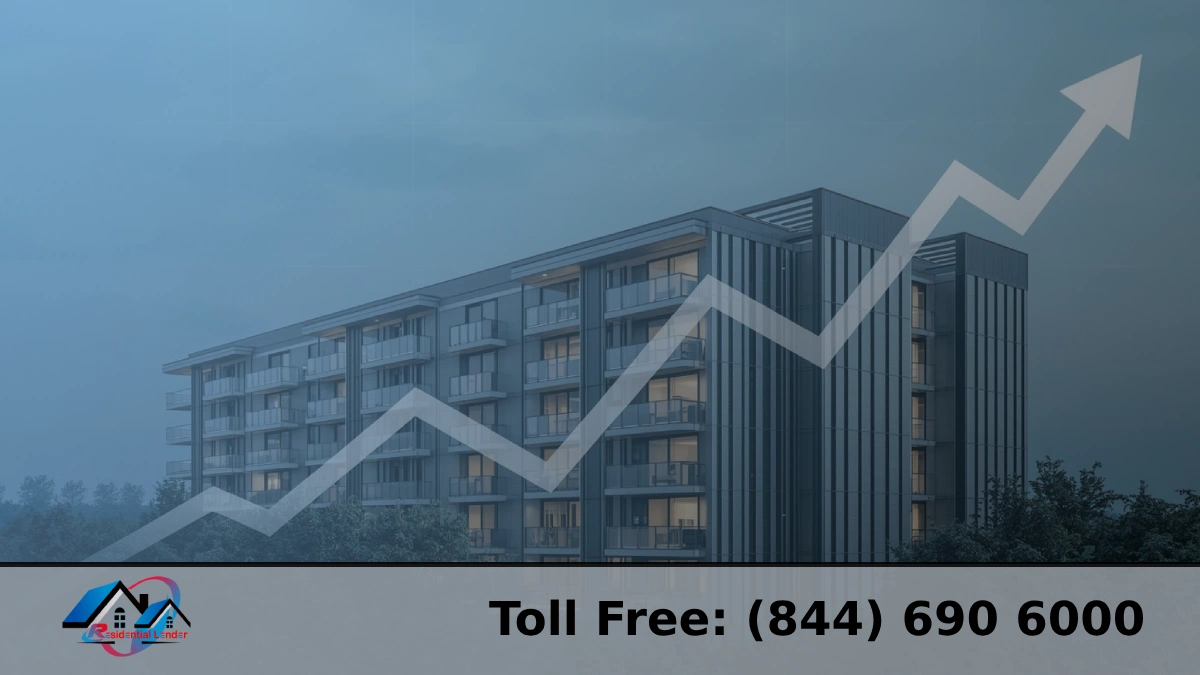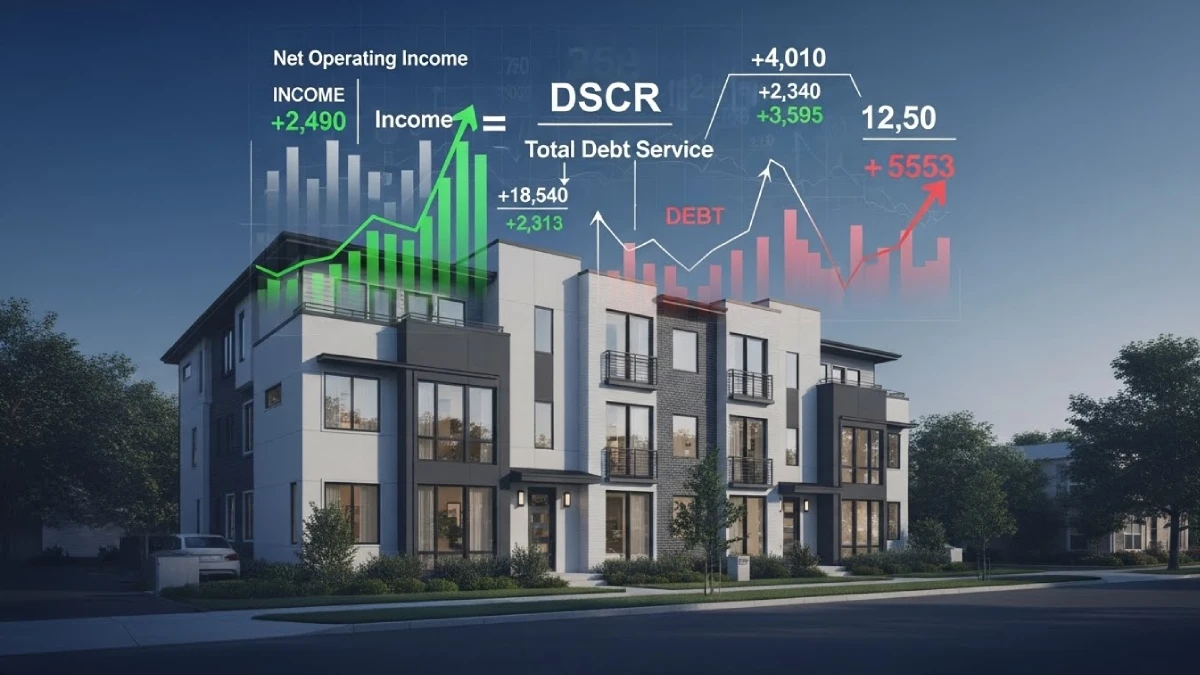For every year ending in June 2025, the U.S. Census Bureau said that 478,000 privately owned apartments in buildings with five or more units were allowed. This shows that people are still very interested in building multi-family homes.
Many owners find financing new constructions challenging due to concerns about securing loans, high interest rates, and the extensive paperwork involved. Changeable interest rates, like the 5% to 7% range on apartment loans, can make it harder for projects to make money, as we saw in the middle of 2025.
There are many ways that “new construction apartment loans” can help you make your dream come true. By giving you the money and terms you need to achieve, these loans are meant to help you deal with specific problems that come up when you’re building something from scratch.
Among the top 7 benefits of “new construction apartment loans” that are talked about in this blog are flexible financing and long-term profits. We also discuss how our financial expertise can guide you through the process, ensuring that building an apartment complex will be profitable in the long run.
What are New Construction Apartment Loans?
“New construction apartment loans” are a special kind of loan that is only used to build a new apartment building from scratch. Traditional mortgages are for buying an already-built home. These loans, on the other hand, give you the money you need to pay for everything from purchasing the land to finishing the building.
A short-term loan, which is sometimes called a construction loan, is usually the first step. The money is given out in steps, or “draws,” as the project moves forward and specific goals are met. This short-term financing is often turned into a permanent, long-term loan once the building is finished and the home is ready to live in. A key trait is the smooth change from construction to a stabilized property.
For new construction projects, you can use several different types of financing. Bridge loans are a quick way to get money to start a job. Hard money loans, on the other hand, often have higher interest rates but can be fast and flexible for companies that might not be able to get traditional loans. The main difference between these specialized loans and regular loans is that these loans are designed to fit the specific risks and time frame of a new build, so they come with different terms and benefits.
Benefit 1: Flexible Financing and Loan Options
The fact that new building apartment loans are flexible is one of their best features. These goods aren’t made to fit all needs; they’re made to be changed to suit the needs of your project. This means you can get a loan that fits your budget, time frame, and long-term money goals.
For instance, we offer various loan options tailored to different types of investors and projects. A construction loan is usually the best option because it lets you get money at various stages of the building process. This ensures you only pay interest on the money you’ve already spent, which is very helpful for your cash flow. We also work with other unique choices, like DSCR (Debt Service Coverage Ratio) loans, which use the property’s expected rental income instead of the investor’s income to determine loan eligibility. This changes everything for experienced real estate agents with substantial assets and complex tax returns.
On top of that, these loans may have flexible payment plans. During the construction process, there is often a time when you only pay interest. This is a great way to manage your cash flow because you don’t have to pay down the debt while the building is still being built and is not making money yet. This lets you put more money into the building itself, which keeps the project on track. You can also choose “lite-doc” or “no-doc” for skilled and experienced investors.
True “no-doc” loans are pretty much extinct now that the rules have changed, but “lite-doc” loans make the application process easier by needing less standard proof of income. This can significantly reduce the time required to obtain the loan and close.
Benefit 2: Lower Interest Rates and Favorable Terms
The ability to secure low interest rates and favorable terms on a new construction apartment loan is a key reason to consider this option. Lenders are often willing to give better rates on new construction projects because the homes are usually built to modern standards, which means they won’t need as many expensive repairs and upkeep. A house that is newer and better built is more stable, so the lender doesn’t have to take on as much risk when giving the loan.
One of the best things about these loans is that you can change from a variable-rate loan to a fixed-rate loan. A loan’s interest rate often changes during the construction phase. This rate can be tied to a benchmark like the prime rate. People usually do this because the loan amount is paid back over time. It’s often possible to convert a short-term loan into a long-term loan with a fixed rate once the construction is finished and the house is rented out. This keeps your rate fixed and saves you from future changes in the market, giving you stability for the life of your investment.
Additionally, a good Loan to Value (LTV) number can significantly improve your loan terms. The LTV shows how much of a loan you have compared to how much the property is worth. The investor will see that you are a lower-risk borrower if your LTV is lower. This means that you are putting more of your own money into the project. This usually leads to a better interest rate and better loan options. Also, it might help you secure a larger loan amount. Starting with a high LTV does more than help you get a loan; it also sets you up for a more stable and profitable long-term real estate business.
Benefit 3: Building a Stronger Investment from the Ground Up
You have more power when building a new apartment building than when buying an existing one. One significant benefit is that you have complete control over the style, quality, and materials. This lets you start with a fantastic item. You can pick materials that don’t need much upkeep and will last a long time. This will save you money on unexpected fixes and capital costs. This hands-on approach enhances the building’s value, ensuring it retains its value over time and attracts renters.
Plus, a new construction gives you the chance to add modern features that renters want these days. Consider features such as laundry rooms inside the units, high-speed internet, smart home technology, and designated areas for collaboration. More people will rent from you, and they will stay longer if you add these benefits from the start. This smart way of directly attracting renters leads to a better and more stable source of income.
You can also use new technologies and plans that use less energy when you build from the ground up. If you use energy-efficient windows, insulation, and appliances, your renters’ electricity costs will decrease significantly. Not only does this make your house more rentable, but it also helps you get a better return on your money over time. When your property has lower running costs and a higher net income, it is worth more and makes you more money. Building a single-family home is less profitable than building a mixed-use property because it only generates one source of income. This shares your risk and makes the business base more stable and able to grow.
Benefit 4: Meeting the Demand for Affordable Housing
“New construction apartment loans” aren’t just a way to make money; they give people what they need very badly. Many renters spend a significant portion of their income on rent, making it more critical than ever to be able to afford a place to live. As the need for homes grows, it gives developers a unique chance to make money and help their community at the same time.
Building new houses can also lead to special government programs that encourage the building of affordable housing. You can get a loan from the Federal Housing Administration (FHA) or the Department of Housing and Urban Development (HUD). To give you an example, the HUD FHA 221(d)(4) loan is a great way to build a new home or fix up a badly damaged apartment building. Low, fixed interest rates and a long-term repayment plan that spans up to 40 years. These programs may offer better terms than regular loans, which can help a project make more financial sense.
There are also loan options from the Small Business Administration (SBA), such as the 504 loan. You can use these loans for business real estate projects, such as building a new office building. Many SBA loans are extended to businesses that are owned and operated by their owners. But they can still be helpful for some business projects that boost the local economy. When you build new homes, you not only protect your financial future, but you also make the town safer and increase its income. Neighborhoods can come back to life with new construction projects that create jobs and make more homes available. This can help keep rents from going up and make people’s lives better.
Benefit 5: Simplified Underwriting with Expert Guidance
We’ve been reviewing loans for more than 30 years. This is usually the most challenging part of working with banks. We can streamline the screening process for you, given our extensive knowledge of the business. We know how to make your project look its best and what lenders want. We work with over 200 private lenders and investors, so we can find the right person for your project, even if it has unique features that would make a standard bank turn it down.
It’s helpful to know this because the underwriting process for new construction loans can be very different from that for regular mortgages. For some of the loans we offer, like hard money loans or DSCR loans, your credit score isn’t the only thing that matters. The property’s possible income is also significant. This can be a massive help for experienced investors with good projects but complicated finances or a credit past that doesn’t fit the rigid mold of a traditional lender.
You get more than a loan when you work with us. You get a safe way to get around. We’ll be there to help you through the whole process of getting cash, from the first application to the last closing. We want to know what your goals are and help you make them a profitable reality. We’ll be here for you every step of the way to ensure everything goes smoothly and quickly.
Benefit 6: Potential for Higher Appreciation and Equity
One of the best things about new building apartment loans is that they can lead to built-in equity and higher property values. When you build a house from scratch, it usually sells for more than what it cost to buy the land, build it, and finance it. This difference gives you “instant equity,” which means you get a big cash boost as soon as the project is done.
New buildings usually have higher rents and a higher market value than older, less efficient buildings because they are made with more modern materials and designs. People are willing to pay more for a brand-new place that has modern amenities and features that save energy. This means a better and more stable source of income, which raises the value of your asset as a whole.
A good long-term investment in the real estate market is to build a new apartment building. The property’s value is increasing, rent payments are coming in, and the loan debt is being paid off over time, all of which work together to create a powerful wealth-building engine. If your long-term plan is to hold on to the property for ten years (a “fix-and-hold” strategy) and enjoy the cash flow and growth, or if you want to sell it quickly for a profit (a “fix-and-flip” strategy), there is a straightforward way to make much money with new construction. This gives you the freedom to make changes to your investment based on your financial goals and the state of the market.
Benefit 7: Access to a Network of Private Lenders and Investors
One of the best things about working with us is that you can tap into our extensive network of over 200 private loans and investors. This network changes the game for new construction projects by offering builders more options than traditional lenders like Fannie Mae and Freddie Mac. Conventional loans can be an excellent choice for some. Still, they usually have strict requirements and a lengthy approval process that might not work for a new construction project, which is constantly changing.
Because of our network, we can offer more creative and flexible options. When it comes to lending money, private lenders are more likely to look at the project itself rather than just the borrower’s credit history or a strict debt-to-income ratio. This could be the key to securing funding for projects that a regular bank might deem too complicated or risky.
Personalizing the process also speeds up approvals and funds. In construction projects, time is key, and delays can incur significant costs. When we work with our private loan network, we can often get money much faster than if we went through a regular lender. If you’re an investor, we connect you with the right funding source by carefully “matchmaking” your idea with a lender who sees its unique potential. This ensures you not only get a loan, but the right one, with terms that fit your goals and schedule.
Conclusion
“New construction apartment loans” are more than just a way to get money; they’re also a way to build a real estate business that will make money and last. We’ve discussed the seven main benefits, including flexible financing and favorable terms, the opportunity to increase ownership, and the chance to make a larger, more modern investment. You can speed up the underwriting process and get the money you need to meet the growing demand for homes by using our knowledge and extensive network of lenders.
It’s time to stop thinking and start making things. You can make your dream of building a new apartment development come true. We’re here to help you do it. Get in touch with us right away for a free consultation, and we’ll help you set the stage for your next great real estate deal.
FAQs
1. What are the typical eligibility requirements for a new construction apartment loan?
Getting a new construction loan depends on many things, like your credit score, income, assets, and how well you plan your project. Lenders want to see that you have a good financial background, a credit score of at least 680 to 720, and a low ratio of your debt to your income. They will also carefully review your project plan and request a detailed schedule for building, blueprints, and an appraisal that indicates the property’s expected value upon completion.
2. How much of a down payment is required for a new construction apartment loan?
Typically, 20% to 25% of the total project cost constitutes the down payment, also known as an equity contribution, for a new building loan. Lenders require a substantial down payment because they believe that purchasing a new home poses a higher risk. A bigger down payment shows that you’re serious about the job and lowers the lender’s risk.
3. What is the difference between a recourse and a non-recourse loan?
Suppose you don’t pay back a recourse loan. In that case, the lender can go after your assets, like your home or other investments, if the security, like the apartment complex, isn’t enough to cover the debt. A non-recourse loan, on the other hand, only lets the lender claim the collateral property as protection. Non-recourse loans are often better for investors, but they can be hard to get because they are usually only given to bigger, lower-risk projects that can afford the higher loan costs. It is possible for long-term permanent loans not to be recourse, but most private building loans are.
4. What is the typical timeline for new construction loan approval and disbursement?
For the most part, getting a new building loan takes longer than getting a regular mortgage. This is because the investor must carefully review your finances and the project plan, a process that can take 30 to 60 days. The money is not sent out all at once after it has been accepted. Instead, they are given to you in stages, or “draws,” as you meet specific building goals. This staged distribution ensures the project is proceeding as planned and that funds are being allocated as intended.
5. What are the standard fees associated with a new construction apartment loan?
You will also have to pay different fees on top of the interest rate. One of these is usually an origination fee, which is a fee for handling the loan. This fee is typically a percentage of the total loan amount. You’ll also have to pay appraisal fees for both the land and the property you want to build on it, as well as inspection fees for regular checks during building and legal and title fees. These fees are often added to the loan amount as a whole.








